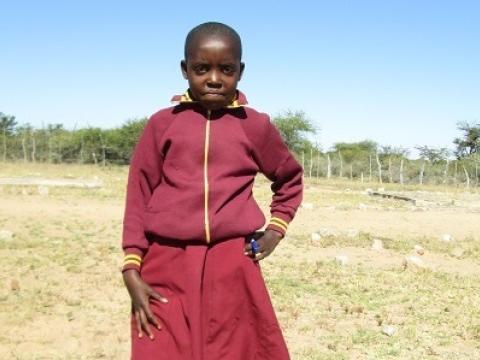Improving Girls’ Access through Transforming Education: The IGATE programme in Zimbabwe

“I got to know about the IGATE project when we were taught by our matron, Mrs. Ndlovu in class,” says 11-year-old Basitsana. “Before I joined the IGATE [Power Within] club, I used to be so shy, but now I feel that I am more confident and I no longer fear to talk in front of others.”
Supporting girls to become more confident in themselves and the roles they play in their families and communities is only one goal of the IGATE – Improving Girls Access through Transforming Education – programme in Zimbabwe. As one of World Vision’s largest education and gender projects, IGATE partners believe that through it’s reach, impact will be achieved in the country and within World Vision’s broader work on gender.
“By looking at how to comprehensively target all key actors in a girl’s life, IGATE is moving beyond a traditional “one model fits all” style of development programming and is collaborating with all leaders and influencers to initiate change and support girls’ education,” says IGATE Consortium Leader, Craig Geddes.
The IGATE Programme
Sponsored by the Department for International Development, Girls Education Challenge Fund, this six-member consortium, which includes World Vision, aims to reach 90,000 women and girls through a school-centred, holistic approach to improving girls access to, and retention and performance in, school.
Read the IGATE 2014 - 2015 Annual Report
In partnership with the Ministry of Primary and Secondary Education, and the Ministry of Women Affairs, Gender and Community Development, IGATE addresses:
- Girls’ understanding of their own potential, power, capacity and knowledge
- Familial understanding of a girl’s potential, her need for education and the benefits to her and her family
- Familial financial capacity to support girls’ education
- School capacity to ensure schools are girl-friendly places of education
- Religious and traditional leaders’ understanding of, and support for, girls and their participation in education
- Distance to and from school
- Male champion and role modeling support
- Literacy and reading outcomes through reading clubs
- Community capacity for social accountability and scorecarding
The IGATE programme works to impact these outcomes through locally contextualised models that focus on girls, their families, churches, the community, schools, and local and national goverments. Programmes like the Power Within girls club have helped children like Basitsana feel more equipped to succeed at school and in life.
“We have been taught about child rights, career guidance, and also communication,” continues Basitsana. “I think as I continue with this project, I will grow up to be a more clever and confident person.”
Other models, like the Village Savings and Lending Scheme, have helped parents, like Taki, pay school her children’s school fees. “My life has significantly changed since starting activities with IGATE,” says Taki.“I used to face difficulty in paying school fees…Now I can pay school fees for my children and also buy other necessities, especially for my daughter, such as sanitary pads.”
Although women and girls are the focus of the education programme, partnering with and educating men is critical to IGATE’s success, and the sustainability of the programme. One such example is the active participation of men in Mother’s Groups that identify and address barriers that hinder girls from accessing quality education.
“For me as a traditional leader, a Mother’s Group is not a group of mothers. Rather, it is a ‘mother figure’ for the community,” says the Headman of the Lupane District in Zimbabwe. “Therefore, I feel honoured to participate in such a platform as it will assist the girls in my area of jurisdiction.”
Through religious and traditional leadership education, IGATE also works directly with male and female leaders to help them respond to gender based inequalities and discrimination, and to reduce negative practices like polygamy, female genital mutilation and gender based violence.
Measuring IGATE’s impact
In order to ensure that IGATE can speak to attribution and direct linkage to impact, World Vision and partners are also running the project as a randomised control trial, quasi-experimental design, which allows for the tracking of a cohort of girls through both treatment and control schools through the life of the programme. Upon completion of this project, IGATE will have publishable, scientific data enforcing the programme’s models and the activities implemented.
“Through initiatives like IGATE, World Vision and its partners are committed to implementing comprehensive, sustainable activities that will help bring transformation to girls, women, families, communities and entire nations,” says Mr. Geddes.